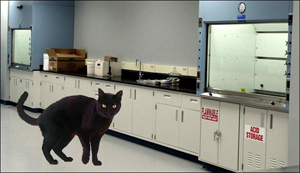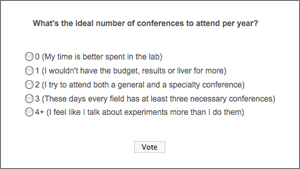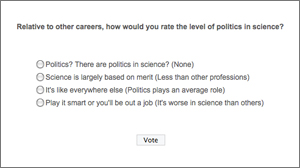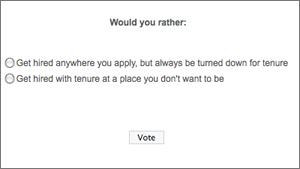![]() If you haven’t heard of social media by now, you may want to sit down for what we’re going to tell you next: Astronauts have landed on the moon! We’re at a point where it’s hard to ignore social media – for better or worse. (When Metamucil has a fanpage on Facebook, it’s clearly getting out of control…) However, what may be less obvious are the personal and professional implications of using social media for scientists.
If you haven’t heard of social media by now, you may want to sit down for what we’re going to tell you next: Astronauts have landed on the moon! We’re at a point where it’s hard to ignore social media – for better or worse. (When Metamucil has a fanpage on Facebook, it’s clearly getting out of control…) However, what may be less obvious are the personal and professional implications of using social media for scientists.
BenchLife
Being a scientist isn’t just about doing experiments, so neither are we. This is where we make breakthroughs beyond the bench for scientists.
Social Media for Scientists – What’s Most Popular?
by
Only MacGyver Could Make a Gourmet Quiche With Fewer Ingredients
by
 The weekend is here and let’s face it, the same bowl of cereal or piece of toast that does the trick during the week just ain’t gonna cut it on our days off. The weekend is a time to wake up leisurely, walk around in a robe and read the paper while enjoying a veritable cornucopia of delicious brunch food. Well, that would be nice. Unfortunately, we may have to go into lab, we don’t have time to cook, we don’t have money for expensive ingredients and we don’t own a robe. That leaves us with only one question: WWMD (What Would MacGyver Do)?
The weekend is here and let’s face it, the same bowl of cereal or piece of toast that does the trick during the week just ain’t gonna cut it on our days off. The weekend is a time to wake up leisurely, walk around in a robe and read the paper while enjoying a veritable cornucopia of delicious brunch food. Well, that would be nice. Unfortunately, we may have to go into lab, we don’t have time to cook, we don’t have money for expensive ingredients and we don’t own a robe. That leaves us with only one question: WWMD (What Would MacGyver Do)?
Superstition Doesn’t Affect Experiments (Knock On Wood)
by
 Maybe you think twice before starting a new project on the 13th, or perhaps a pinch of sodium chloride flies over your left shoulder at the beginning of every experiment. It can be tough to get experiments to work and when they do, it’s not unusual to repeat every detail – from the reagents used to the underwear worn. And thus, the birth of superstition in the laboratory- but who’s to say all of those details don’t actually matter…
Maybe you think twice before starting a new project on the 13th, or perhaps a pinch of sodium chloride flies over your left shoulder at the beginning of every experiment. It can be tough to get experiments to work and when they do, it’s not unusual to repeat every detail – from the reagents used to the underwear worn. And thus, the birth of superstition in the laboratory- but who’s to say all of those details don’t actually matter…
Licensing Deals: Lab Treasure or Personal Pleasure?
by
 Ah, remember the glory days of the 20% NIH funding line? Or the feeling of seeing a lab grow? Or when people used to talk about those things called “jobs”? Well, those memories are fading for us too. Surviving tough times in the lab requires a bit of creativity and this is particularly true when it comes to figuring out how to pay the bills.
Ah, remember the glory days of the 20% NIH funding line? Or the feeling of seeing a lab grow? Or when people used to talk about those things called “jobs”? Well, those memories are fading for us too. Surviving tough times in the lab requires a bit of creativity and this is particularly true when it comes to figuring out how to pay the bills.
How Important are Scientific Conferences?
by
 Conference season is in full swing and many of our poster tubes have logged more mileage than Mark Hamill got from Star Wars. Coming off of the recent American Chemical Society (ACS) and American Association of Cancer Research (AACR) meetings, there is little rest before the summer Gordon conference schedule begins. Although a scientific conference rarely lasts for more than a week, we often prepare for months on end – performing last-minute experiments, designing beautiful posters and battling large-format printers. So how many times a year should we be putting ourselves through this wringer?
Conference season is in full swing and many of our poster tubes have logged more mileage than Mark Hamill got from Star Wars. Coming off of the recent American Chemical Society (ACS) and American Association of Cancer Research (AACR) meetings, there is little rest before the summer Gordon conference schedule begins. Although a scientific conference rarely lasts for more than a week, we often prepare for months on end – performing last-minute experiments, designing beautiful posters and battling large-format printers. So how many times a year should we be putting ourselves through this wringer?
How Scientists Really Get Trained
by
 For novelists: books, imagination and Microsoft Word. For pilots: classes, flight simulators, and wingmen. For athletes: coaches, teammates, and addiction counselors… Developing into a true professional requires a few indispensable resources tailored to the craft. So what would we say “For Scientists:”?
For novelists: books, imagination and Microsoft Word. For pilots: classes, flight simulators, and wingmen. For athletes: coaches, teammates, and addiction counselors… Developing into a true professional requires a few indispensable resources tailored to the craft. So what would we say “For Scientists:”?
How Big is the Tenure Carrot?
by
Larry’s Luxurious Artichoke Dip
by
Politics in Science? Surely We’re Not as Bad as Congress…
by
 These days, it’s hard to ignore Washington. With increasingly partisan bickering and near record low congressional approval ratings, it’s clear to see how politics in the workplace (especially when it’s politics itself!) can affect job performance. But as a career, how does science rate- are internal politics preventing real progress?
These days, it’s hard to ignore Washington. With increasingly partisan bickering and near record low congressional approval ratings, it’s clear to see how politics in the workplace (especially when it’s politics itself!) can affect job performance. But as a career, how does science rate- are internal politics preventing real progress?
The Short Straw Works the Graveyard Shift
by
 The Slate Rock and Gravel Company was way ahead of their time. They realized that although they had a big labor force, their work was limited by the number of Dino-cranes. However, by splitting the workforce into multiple shifts, they would be able to mine the quarry much faster than if they relied solely on a single shift by Fred Flintstone. What if one day our P.I.s came to the same realization…
The Slate Rock and Gravel Company was way ahead of their time. They realized that although they had a big labor force, their work was limited by the number of Dino-cranes. However, by splitting the workforce into multiple shifts, they would be able to mine the quarry much faster than if they relied solely on a single shift by Fred Flintstone. What if one day our P.I.s came to the same realization…



